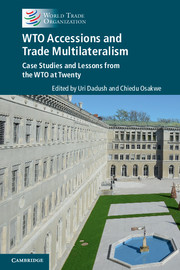Book contents
- Frontmatter
- Dedication
- Contents
- List of contributors
- Foreword
- Acknowledgements
- List of abbreviations
- Editors' note
- PART I WTO accessions, the trading system and the global economy
- 1 A reflection on accessions as the WTO turns twenty
- 2 Developments in the global economy and trading system effects: the transformation of world trade
- 3 The WTO and the global economy: contemporary challenges and possible responses
- 4 The structural reform implications of WTO accession
- 5 The macroeconomic implications of WTO accession
- 6 The future of Asia: unleashing the power of trade and governance
- 7 Eurasian Economic Union integration: timetable, priorities and challenges
- 8 WTO accessions: what does the academic literature say?
- PART II Overview: systemic outcomes from accessions
- PART III Members’ perspectives on accession negotiations
- PART IV Working party chairpersons’ perspectives on accession negotiations
- PART V Salient features inWTOAccession Protocols
- PART VI Conclusion
- Annex: Contributor biographies
- Index
- Plate section
- References
5 - The macroeconomic implications of WTO accession
from PART I - WTO accessions, the trading system and the global economy
Published online by Cambridge University Press: 05 November 2015
- Frontmatter
- Dedication
- Contents
- List of contributors
- Foreword
- Acknowledgements
- List of abbreviations
- Editors' note
- PART I WTO accessions, the trading system and the global economy
- 1 A reflection on accessions as the WTO turns twenty
- 2 Developments in the global economy and trading system effects: the transformation of world trade
- 3 The WTO and the global economy: contemporary challenges and possible responses
- 4 The structural reform implications of WTO accession
- 5 The macroeconomic implications of WTO accession
- 6 The future of Asia: unleashing the power of trade and governance
- 7 Eurasian Economic Union integration: timetable, priorities and challenges
- 8 WTO accessions: what does the academic literature say?
- PART II Overview: systemic outcomes from accessions
- PART III Members’ perspectives on accession negotiations
- PART IV Working party chairpersons’ perspectives on accession negotiations
- PART V Salient features inWTOAccession Protocols
- PART VI Conclusion
- Annex: Contributor biographies
- Index
- Plate section
- References
Summary
ABSTRACT
This chapter proposes a holistic framework by which acceding governments may evaluate the macroeconomic impact of joining the WTO. Because both acceding governments and WTO members are interested in preserving their own systemic stability and the stability of the multilateral trading system, evaluation of the Accession Package can be achieved by examining its impact on the domestic and external stability of the acceding country. The chapter concludes that, in the long run, the impact should be positive, and should be driven by better resource allocation as the acceding economy opens to international trade, makes deep structural reforms and aligns its institutions and policies with internationally recognised standards. However, in the short term, implementation of WTO commitments may lead to substantial adjustment costs in the public and private sectors. Overall, the design and implementation of WTO accession commitments is a matter of public policy that should aim to promote systemic stability and accelerate domestic reform, while addressing transitional costs.
Accession to the WTO is an outcome of negotiations. The applicant government engages in bilateral negotiations with interested WTO members on concessions and specific commitments on market access for goods and services. The results of these bilateral negotiations are consolidated into the final Accession Package. New members enjoy the privileges that the incumbent members give to them and the security that the trading rules provide. In return, acceding countries make commitments to abide by WTO rules and to open their markets. Such commitments have different dimensions – legal, institutional and economic – and usually focus mainly on general rules and individual products and sectors. However, while not explicit, there are also substantial macroeconomic dimensions to the WTO accession commitments, which are the focus of this chapter.
The macroeconomic implications of WTO accession can be viewed through the prism of systemic stability. Obviously, no acceding country would accept commitments that would destabilise its own economic system but, rather, would try to leverage WTO negotiations towards reaching its own domestic goals while using the opportunities opened by WTO membership. On the other hand, it is in the interest of the WTO as a whole to preserve the stability of the multilateral trading system by contributing to maintaining the stability of its members.
- Type
- Chapter
- Information
- WTO Accessions and Trade MultilateralismCase Studies and Lessons from the WTO at Twenty, pp. 122 - 160Publisher: Cambridge University PressPrint publication year: 2015
References
- 1
- Cited by

